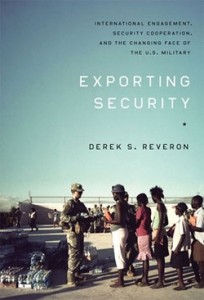|
Reviewed by Robert B. Lloyd, Ph.D., Associate Professor of International Relations, Pepperdine University With both the Cold War and 9-11 behind us, the United States is arguably entering a “post-post” world. Some elements of continuity remain: globalization continues to link states and their peoples ever closer, and security operations against militant Islamist groups such as Al Qaeda and its various affiliates continue apace. The withdrawal of remaining American troops from Iraq and Afghanistan, however, signals the end to a decade of extensive military mobilization and engagement. Furthermore, sluggish economic growth and budget deficits have placed growing constraints on the U.S. military. This new domestic and international environment, and American military experiences of the past two decades, have had and will continue to have a profound impact on American foreign policy, particularly its use of the U.S. military to achieve its security objectives. Derek Reverson, a professor of national security affairs at the Naval War College, tackles this topic in Exporting Security: International Engagement, Security Cooperation, and the Changing Face of the U.S. Military. In his well-written book he contends that while American military power and prestige remain preeminent, changes in the international environment require American foreign policy to embrace a broader conception of security. He advances two main reasons for this view. First, the United States faces new types of international threats that include failed states, piracy, drug trafficking, and terrorism. Second, international security remains essential to provide a stable foundation for economic growth and development. Both American and international security are fostered by an increased emphasis on military cooperation with allies and a broader definition of security that encompasses socioeconomic development, Reverson argues. Approvingly, he cites the 2008 creation of the Africa Command (Africom), a regional combatant command, as a model for this new approach. This command, he asserts, emphasizes security cooperation with partner African countries by developing relationships of a type termed “military diplomacy.” In addition, Africom seeks to work closely and cooperatively with other branches of the U.S. government such as the State Department and the U.S. Agency for International Development. According to the author, opposition to changing the aims and means of the American military comes both from outside and within the military. Civilian objections relate to the Defense Department encroaching on the traditional bureaucratic turf of agencies such as the State Department, and the perception that foreign policy is being militarized. Objections from within the military itself include concerns that a broader mandate undermines a core objective of the military to win wars against potent foes, and that nontraditional military operations are particularly expensive in terms of manpower. In response, Reverson argues that future conflicts will likely resemble American intervention in Somalia of the early 1990s, a combination of American kinetic and nonkinetic activities achieved in cooperation with other state and nonstate actors. Security benefits will accrue to the United States and its partners by cooperation on such issues as preventative and humanitarian interventions and maritime security. While states such as China and India grow in economic and military heft, and could pose a strategic challenge to the United States, it is clear that since the end of the Cold War, intrastate and regional conflicts have preoccupied the U.S.-and likely will continue to preoccupy it. The author makes a well-reasoned argument for the need for the American military to expand its responsibilities and be more cooperative with allies to meet these security threats. A critical political challenge arises with a cooperative as opposed to a confrontational approach. To use the Africom case, the African continent is not central to American security interests. The Somalia intervention debacle of 1993 decisively shifted American opinion against African intervention. This in turn resulted in the tepid and ignominious American response to the gathering genocidal storm in Rwanda that broke in full force a year later. The realities of international relations mean that crises that directly affect the security of the United States and its allies in Northeast or Southwest Asia demand more attention from policymakers than most events in Africa. And even when an African humanitarian or security crisis captures the attention of policymakers, it is not clear that political will for intervention will ensue. The recent “lead from behind” American military actions against Libya’s Qaddafi, while successful, were limited in scope and reluctant in attitude. The careful attention to broad notions of security and preventive diplomacy advocated by the author and institutionalized in Africom may be heading into stiff political headwinds. Nevertheless, the creation of Africom does provide a way for better assessing security in Africa and seeking creative ways in which all facets of hard and soft American power may be brought to bear for security and growth. That model may not be fully replicable to all the regional commands in the world, but the author provides a strong case for how it might “confront intrastate and transnational challenges” on one continent. |


 Exporting Security: International Engagement, Security Cooperation, and the Changing Face of the U.S. Military
Exporting Security: International Engagement, Security Cooperation, and the Changing Face of the U.S. Military